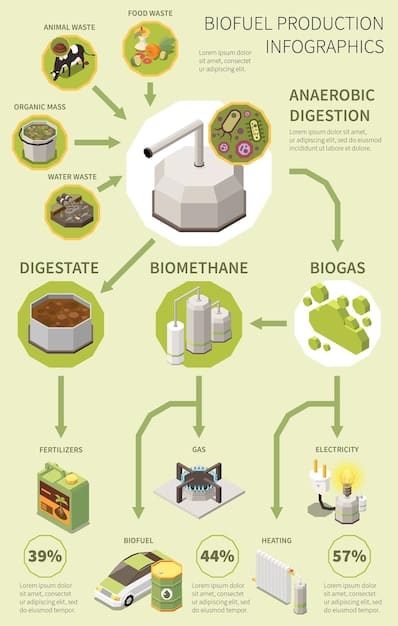Algae Biofuel: The Future of Long-Haul Trucking in the US?

Biofuel breakthroughs, particularly in algae-based fuels, offer a promising pathway to power the future of long-haul trucking in the US, presenting a sustainable alternative to traditional fossil fuels.
Can biofuel breakthroughs: Can algae-based fuels power the future of long-haul trucking in the US? offer a more sustainable path forward for the transportation of goods across the country?
The Promise of Algae Biofuel for Long-Haul Trucking
Algae biofuel represents a potentially revolutionary alternative to traditional fossil fuels, particularly for industries like long-haul trucking. This biofuel source offers numerous environmental and economic advantages, making it a viable solution for reducing carbon emissions and promoting energy independence.
What is Algae Biofuel?
Algae biofuel is a type of biofuel derived from algae. Through photosynthesis, algae convert sunlight, water, and carbon dioxide into lipids (oils) that can be processed into biodiesel. Algae are highly efficient at capturing CO2, making them a carbon-neutral or even carbon-negative fuel source.
Environmental Benefits
One of the significant advantages of algae biofuel is its environmental friendliness. Compared to fossil fuels, algae biofuel produces significantly fewer greenhouse gas emissions. Additionally, algae cultivation does not require arable land, reducing competition with food crops and minimizing deforestation.

- Reduced Carbon Emissions
- Sustainable Land Use
- Water Resource Efficiency
In conclusion, algae biofuel offers a promising avenue for sustainable transportation, addressing key environmental concerns and presenting a pathway toward a greener future for long-haul trucking.
Challenges Facing Algae Biofuel Production
Despite its immense potential, algae biofuel production faces several significant challenges. Overcoming these hurdles is crucial to making algae biofuel a commercially viable and widely adopted alternative in the long-haul trucking industry.
Scalability
Scaling up algae biofuel production to meet the demands of the long-haul trucking industry is a complex undertaking. Current production levels are insufficient to replace a substantial percentage of fossil fuels, and expanding production requires significant investment in infrastructure and technology.
Cost Competitiveness
One of the major barriers to algae biofuel adoption is its cost. Currently, producing algae biofuel is more expensive than producing traditional diesel. Reducing production costs through technological advancements and economies of scale is essential to making algae biofuel competitive in the market.
- High Initial Investment
- Operational Costs
- Technological Limitations
Addressing these challenges requires collaborative efforts from researchers, policymakers, and industry stakeholders to foster innovation, reduce costs, and create a supportive environment for algae biofuel production.
Technological Advances in Algae Biofuel Production
Advancements in technology are playing a pivotal role in addressing the challenges associated with algae biofuel production. Innovations in cultivation, harvesting, and processing methods are enhancing the efficiency and economic viability of algae biofuel.
Improved Cultivation Techniques
New cultivation techniques are being developed to increase algae biomass production. These include optimizing light exposure, nutrient delivery, and temperature control to maximize algae growth rates. Techniques like photobioreactors and open pond systems are continually refined to improve efficiency.
Efficient Harvesting Methods
Harvesting algae efficiently is critical for reducing production costs. Innovative methods such as flocculation, filtration, and centrifugation are being employed to separate algae biomass from water. These techniques are becoming more energy-efficient and cost-effective.

- Lipid Extraction Optimization
- Advanced Conversion Processes
- Waste Stream Utilization
These technological advances are essential for driving down the cost of algae biofuel and making it a feasible alternative for powering long-haul trucks, contributing to a more sustainable transportation sector.
Policy and Regulatory Support for Algae Biofuel
Government policies and regulations play a vital role in supporting the development and adoption of algae biofuel. Incentives, mandates, and standards can create a favorable environment for algae biofuel producers and encourage the use of sustainable fuels in the transportation sector.
Incentives and Subsidies
Financial incentives such as tax credits, grants, and subsidies can help offset the high upfront costs of algae biofuel production. These incentives encourage investment in research and development and help bridge the cost gap between algae biofuel and traditional fossil fuels.
Renewable Fuel Standards
Renewable Fuel Standards (RFS) mandate the blending of biofuels into the transportation fuel supply. By setting targets for biofuel usage, RFS policies create a guaranteed market for algae biofuel and stimulate production.
Supportive policies can create a stable and predictable market for algae biofuel, attracting investment and fostering innovation. These measures are essential for realizing the full potential of algae biofuel as a sustainable transportation solution.
Economic Opportunities in Algae Biofuel Production
The growth of the algae biofuel industry presents significant economic opportunities for the US. From job creation to energy independence, algae biofuel can contribute to economic growth and enhance the country’s energy security.
Job Creation
Algae biofuel production can create jobs in various sectors, including agriculture, biotechnology, engineering, and transportation. These jobs range from research and development to cultivation and processing, providing employment opportunities in both rural and urban areas.
Energy Independence
By reducing reliance on foreign oil, algae biofuel can enhance the energy independence of the US. Domestic algae biofuel production can provide a secure and stable supply of transportation fuel, insulating the country from global oil price fluctuations and geopolitical risks.
Investing in algae biofuel can stimulate economic growth, create jobs, and enhance the nation’s energy security, making it a strategically important sector for the US economy.
Future Outlook for Algae Biofuel in Long-Haul Trucking
The future of algae biofuel in the long-haul trucking industry looks promising, with ongoing research, technological advancements, and supportive policies paving the way for wider adoption. As production costs decrease and efficiency improves, algae biofuel is poised to play a significant role in decarbonizing the transportation sector.
Continued Research and Development
Continued investment in research and development is essential for overcoming the remaining challenges in algae biofuel production. Innovations in genetics, cultivation, and processing are continually improving the performance and cost-effectiveness of algae biofuel.
Integration with Existing Infrastructure
Algae biofuel can be integrated into existing trucking infrastructure with minimal modifications. Biodiesel produced from algae can be used in conventional diesel engines, making it a drop-in replacement for fossil fuels. This compatibility simplifies the transition to sustainable fuels.
The integration of algae biofuel into the long-haul trucking industry represents a significant step toward a more sustainable and environmentally friendly transportation sector. With continued progress and support, algae biofuel can help power the future of long-haul trucking in the US.
| Key Point | Brief Description |
|---|---|
| 🌱 Algae Biofuel Basics | Fuel derived from algae, converts sunlight, water, & CO2 into biodiesel. |
| 💰 Cost Challenges | High production costs hinder market competitiveness. Technological advances are key. |
| 🤝 Policy Support | Government incentives & renewable fuel standards drive adoption. |
| 🚚 Future Integration | Drop-in replacement for diesel, seamless integration with existing infrastructure. |
Energy Efficient Algae Biofuel?
Below are some frequently asked questions about energy efficient algae biofuel:
▼
Algae biofuel is a renewable fuel derived from algae, which converts sunlight, water, and carbon dioxide into lipids that can be processed into biodiesel, offering a sustainable alternative to fossil fuels.
▼
It’s sustainable due to its lower carbon emissions compared to fossil fuels, efficient land use as it doesn’t require arable land, and ability to capture and reuse CO2 during production.
▼
Key challenges include scalability to meet industrial demand, cost competitiveness compared to traditional diesel, and ongoing technological improvements to reduce production expenses.
▼
Government incentives like tax credits, subsidies, and the implementation of Renewable Fuel Standards (RFS) help create a favorable market environment for algae biofuel producers boosting adoption.
▼
Algae biofuel can stimulate economic growth through job creation in agriculture and biotechnology, enhances energy independence by reducing reliance on foreign oil, contributing to stronger local economies.
Conclusion
As we look to the future, the potential of algae-based fuels powering long-haul trucking in the US is increasingly promising. With ongoing technological advancements, supportive policies, and growing economic opportunities, algae biofuel stands as a viable path toward a sustainable and environmentally friendly transportation sector, aligning with the urgent need to decarbonize and secure a greener future.





